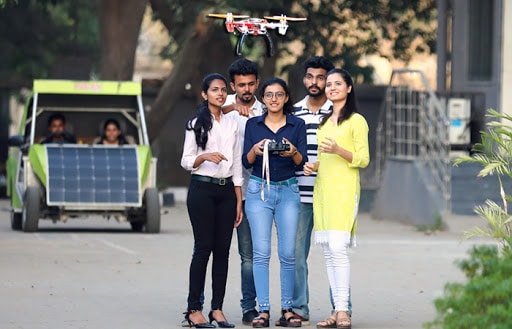Accredited with B+ Grade by NAAC Gujarati Linguistic Minority Institution DTE Code: 3460
- Home
- About us
- Academics
- Admissions
- Life @ UCoE
- IQAC
- Placements
- Examination
Apply the knowledge of mathematics, science, engineering fundamentals and an engineering specialisation to the solution of complex engineering problems.
Identify, formulate, review research literature, analyse complex engineering problems and reach substantiated conclusions by using first principles of mathematics, natural sciences and engineering sciences.
Design solutions for complex engineering problems and design system components or processes that meet the specified needs with appropriate consideration for the public health and safety, and the cultural, societal and environmental considerations.
Use research-based knowledge and research methods including design of experiments, analysis and interpretation of data, and synthesis of the information to provide valid conclusions.
Create, select and apply appropriate techniques, resources and modern engineering and IT tools, including prediction and modelling to complex engineering activities with an understanding of the limitations.
Apply reasoning informed by the contextual knowledge to assess societal, health, safety, legal and cultural issues and the consequent responsibilities relevant to the professional engineering practice.
Understand the impact of the professional engineering solutions in societal and environmental contexts, and demonstrate the knowledge of and need for sustainable development.
Apply ethical principles and commit to professional ethics and responsibilities and norms of the engineering practice.
Function effectively as an individual and as a member or leader in diverse teams and in multidisciplinary settings.
Communicate effectively on complex engineering activities with the engineering community and with society at large, such as being able to comprehend and write effective reports and design documentation, make effective presentations, and give and receive clear instructions.
Demonstrate knowledge and understanding of the engineering and management principles, and apply these to one’s own work as a member and leader in a team to manage projects and in multidisciplinary environments.
Recognise the need for, and have the preparation and ability to engage in independent and life-long learning in the broadest context of technological change.
Students will be able to understand, analyze and develop software programmes in the areas related to an algorithm, system software, multimedia, web design, big data, embedded systems and networking for efficient design of a computer-based system.
Students will be able to demonstrate their ability to adopt a rapidly changing environment by having learned and applied new skills and new technology
Students will be provided with education foundation that prepares them for excellence, leadership, encouragement to professional ethics and active participation required for a successful career.
To develop graduates capable of applying the principles of mathematics, science, and computer science to solve interdisciplinary domains problems.
To develop graduates who will exhibit teamwork with professional ethics, effective communication skills and apply knowledge in societal context.
To prepare students with a capability to successfully get employed or become an entrepreneur or take up higher education in pursuit of lifelong learning.
Near Bhajanlal Dairy & Punyadham,
Kaman Bhiwandi Road,
Vasai, Palghar – 401208
+91 800 7000 755
+91 800 7478 659
+91 840 7979 167
We welcome all aspirants to create an incredible legacy in the field of Artificial Intelligence & Machine Learning, Civil Engineering, Computer Engineering, Data Engineering, and Information Technology Engineering

